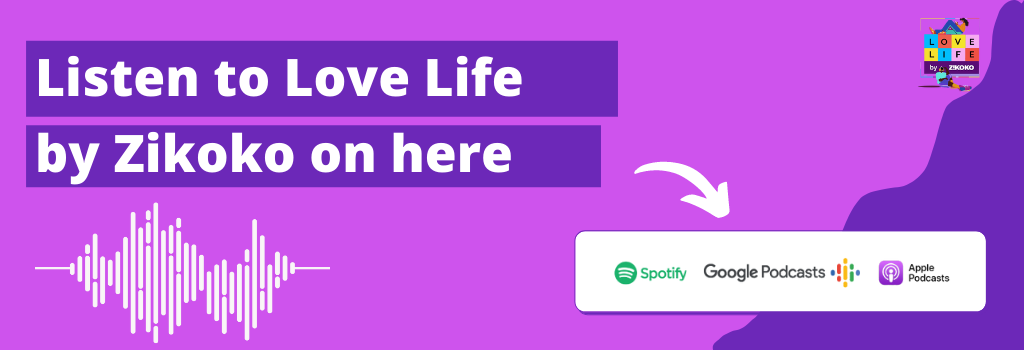Love Life is a Zikoko weekly series about love, relationships, situationships, entanglements and everything in between.
Gbemi, 25, and Ruoyu, 26, are a Nigerian and Chinese couple who really want to get married. For today’s Love Life, they talk about how being a Nigerian and Chinese couple living in America is holding them back from saying “I Do”.
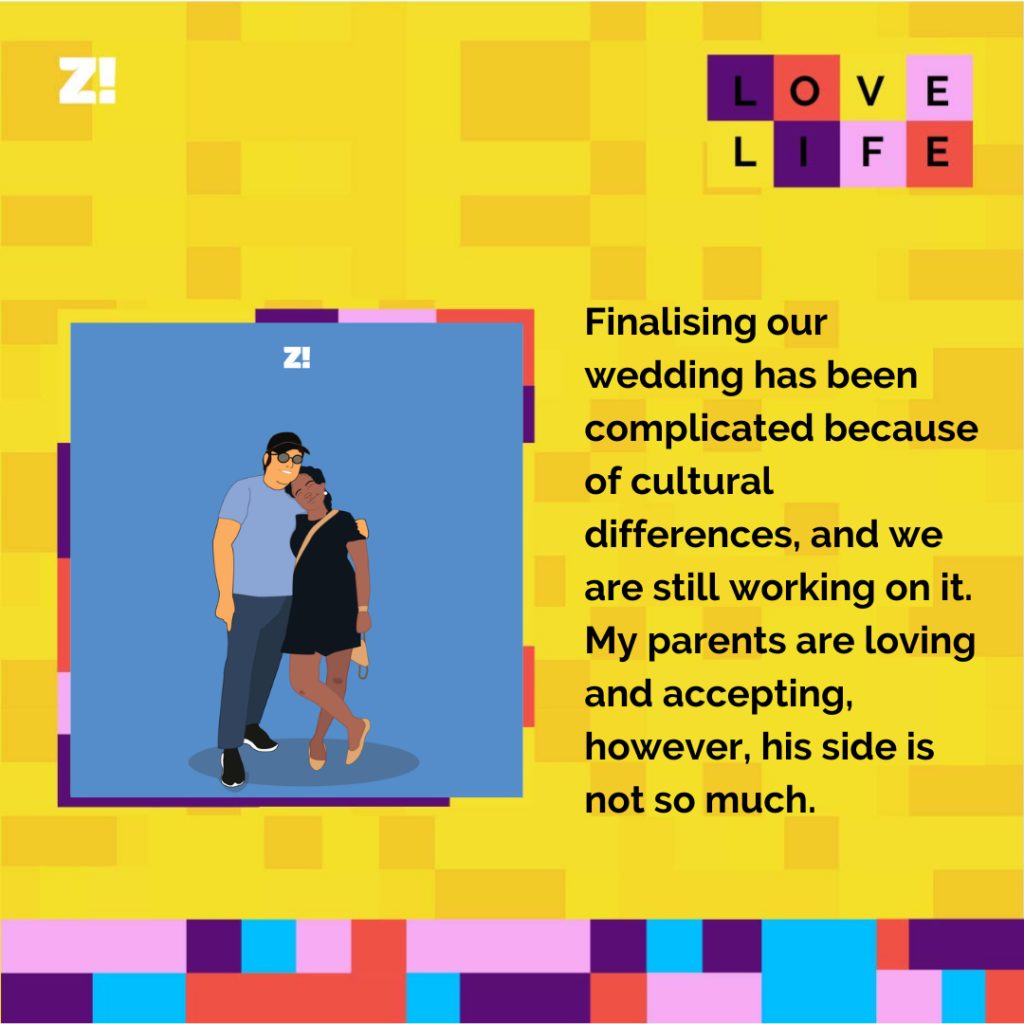
What is your earliest memory of each other?
Gbemi: That will be 2018, our final year of university. We took a course together, and what I remember most was how Ruoyu always went out of his way to make sure I was comfortable.
Ruoyu: Gbemi and I were assigned to the same project group. That’s how we started talking to each other. She was a very happy girl. She always had a smile for me and was willing to listen to everything I had to say. We talked a lot. The more we talked, the more we got familiar.
What did you both talk about?
Gbemi: I think the very first thing was movies, because he asked me to go watch a movie with him. Afterwards, we went to eat. I felt totally relaxed around him. I had my natural hair out and no make-up. Even when we went to eat, I was so comfortable that I ate with my hands.
Ruoyu: We spoke about things that were popular at the time. I remember that Black Panther had just premiered, so it was one of the things we spoke about too. Because we were always talking, we quickly found a big common ground for both of us — our love for food.
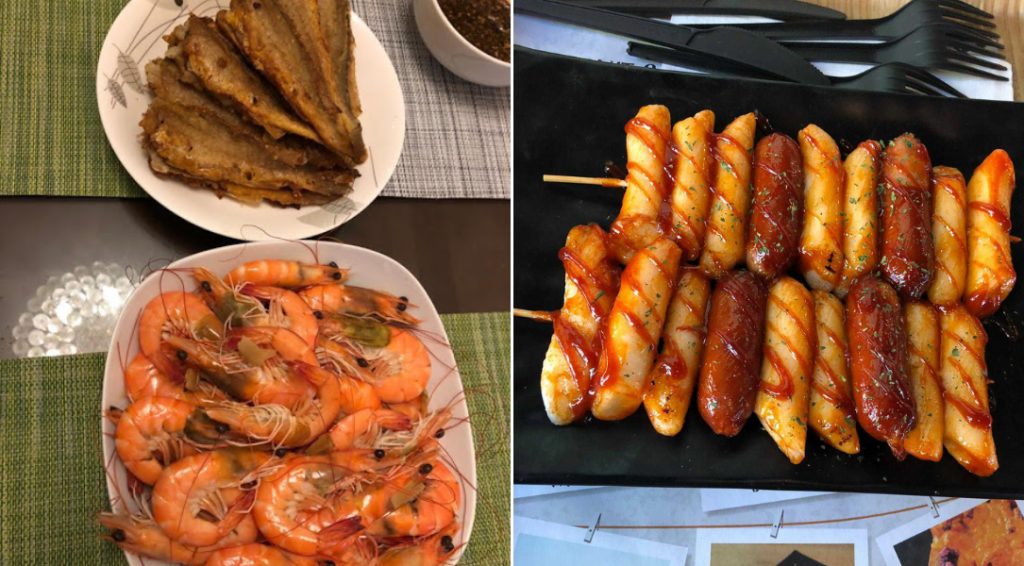
We both love Asian food, Chinese, Korean, Japanese (maybe not Japanese for Gbemi). I learned that Nigerian and Chinese food are similar to an extent.
They are?
Ruoyu: Yes. Both have spicy tastes, they use beef/lamb/goat for many different dishes, and we all appreciate good fried rice.
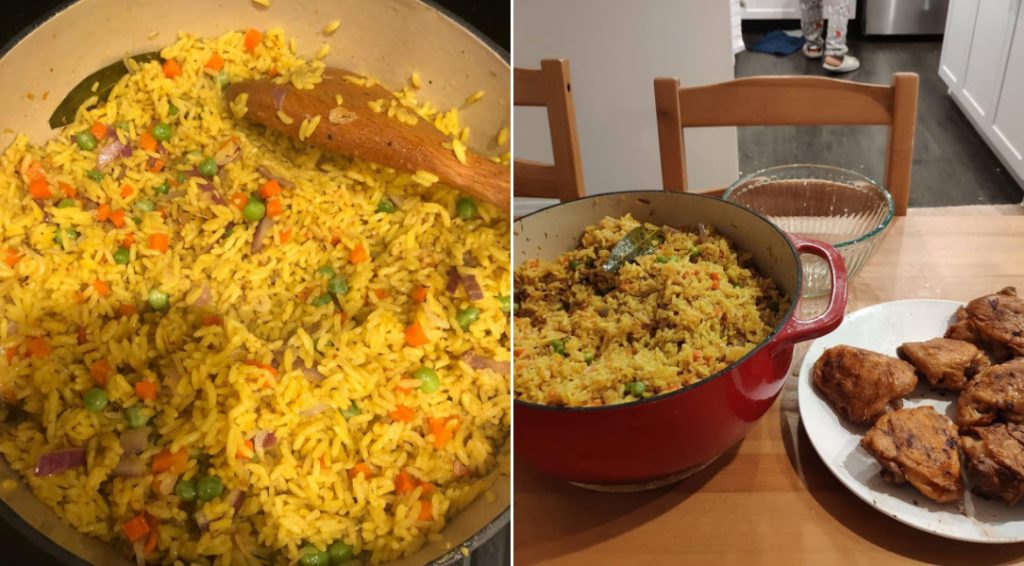
Gbemi: Their fish dishes are so good too. There’s fish stew, fish pepper soup, fried fish, etc. There’s also suya, but with skewers. Also, Chinese people use just as many spices as Nigerians.
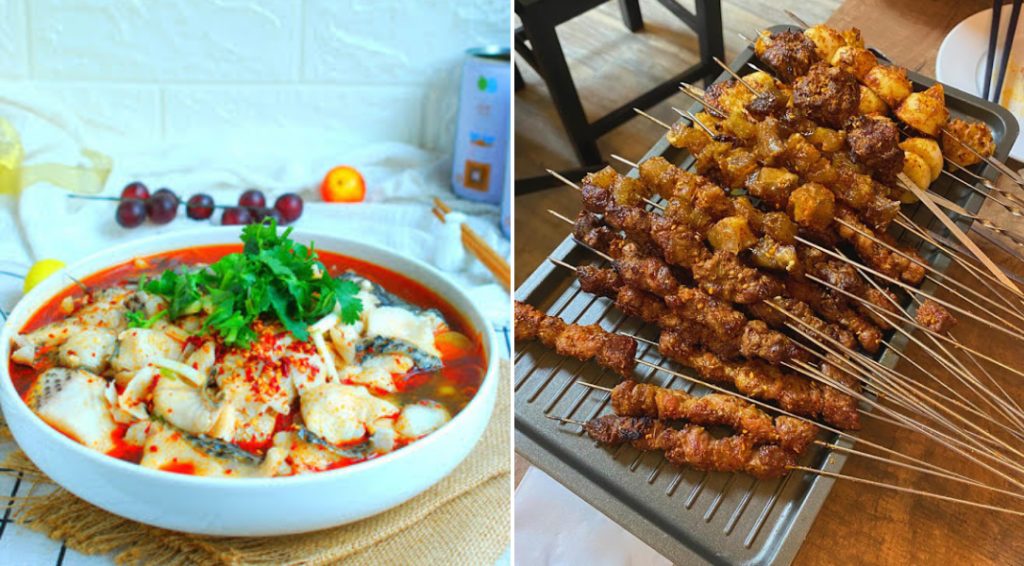
Interesting.
Ruoyu: Haha. Also, the first time we went out together, we had Korean spicy chicken. We both used our hands and made a mess, so it was not only Gbemi.
When did you shift from being friends to a serious relationship?
Gbemi: That was a week after we went out to eat. The whole thing happened pretty quickly. I guess that’s how it is when you are certain of how you feel about the other person. I was certain of my feelings for Ruoyu. I knew I liked him, but we didn’t have enough time. It was our last semester, and he had accepted a job offer in Washington. Since he would be moving, I was worried he would not ask me out and that our friendship would die before it had a chance to blossom into a romantic relationship.
But he did. And I said yes. I didn’t have to think about it twice. What I felt for him was genuine enough to take risks on.
Ruoyu: The risk, in this case, was my move to Washington, and what it would mean for the both of us. But I’m glad I asked her to be my girlfriend, and I am glad that she said yes.
Do you remember the exact way this happened?
Gbemi: Oh my God yes. He said, “Would you be my girlfriend?” in English, and then he said something else in Chinese that I didn’t understand. But it was so powerful and heartfelt that it moved me to tears.
Ruoyu: I looked at her and told her that I love her big eyes and beautiful cheeks. And then I said, “Can you be my girlfriend?” in Chinese and in English.
你能做我的女朋友吗?
Ni neng zuo wo de nv peng you ma?
After she said yes I said, “Wo ai ni.” I love you.
Gbemi: The whole thing was so emotional. I was happy that he asked, happy that he meant it. I didn’t think about anything else, just the fact that he asked. It was after everything that I started thinking about moving to Washington to be with him. I didn’t even know what job offer he got or what the job would be.
LMAO ah. What plan did you come up with?
Gbemi: I had a job plan for me to work in the DC area, and there were a few job options open for me. My plan was to work a bit — perhaps one or two years — and then go back to school. But after he asked me to be his girlfriend, we started making plans to go to Washington together and I had to convince my parents to let me go.
Trust me, it wasn’t easy. I had to say I got a job opening in Washington. My dad objected; he wanted to know why I didn’t look for jobs in Maryland, but my mom knew the truth. I don’t lie to her. She wasn’t very open to the idea of me moving in with him. You know, Nigerian parents will always do their thing. I told her, “I’m in love with this guy, he’s worth it, and I’m willing to see whatever happens. If it doesn’t work out, I’ll come back home and cry.” She had no choice but to agree. She told me I had to be responsible for the outcome of whatever decision I was making, and Ruoyu had to swear with his life that I would not regret coming with him.
Wait a minute. Your mum knew about Ruoyu?
Ruoyu: Yes, I met with her mum during our graduation. We spent a few days together. The first time I met with her dad was when we attended her sister’s graduation. I was introduced as Gbemi’s boyfriend and I was so nervous. I didn’t say too much. We had a group lunch together with many other guests. A Chinese-American buffet. Gbemi’s family is very welcoming, and they really treat me as one of their own.
Gbemi: LMAO. Ruoyu even talks to my sister behind my back. I have met his mum too. I went to China with him in 2019. It was really lovely. His mum made a lot of dishes for us. And that was where I tasted my first Chinese fried fish.
But I’m very curious oh. Don’t you both experience cultural differences? How are you bridging them?
Ruoyu: Yes, there certainly are some cultural differences. The first time I heard Gbemi talking to her sister on the phone, I was shocked. I thought they were having a bad fight. It was loud and a lot of talking over each other. I was driving the car. I stopped and told her that I don’t like fierce fighting, especially with family. What’s wrong? Then I learned it was just two Nigerians having a normal chat.
Gbemi: Oh my goodness. You know how Nigerians — actually, let me not generalise. You know how Yorubas can get really loud and go, “is it me you’re talking to like that?” So, I was on the phone with my sister and we were talking, laughing really loud and exchanging words. The next thing I knew, Ruoyu parked the car.
Ruoyu: I think our major difference would be our characteristics. For example, Gbemi’s family likes to make phone calls to check on each other. And they call each other very frequently. At first, I didn’t get used to calling her family to say hi or to be called for that kind of thing. I gradually learned that this was one way they’re showing love.
My family don’t call frequently. But when we do call each other, it lasts for 2+ hours.
Gbemi: Religion is also one area of difference. It’s a big part of the Nigerian identity, but in China, it isn’t. Also, me being Christian and defending Muslims. Ruoyu didn’t get it.
Ruoyu: Gbemi also has to cope with the difference from my side. I sometimes say something and expect her to understand what it implies (even if it means the opposite). For example, she said she wanted a cat as a pet. I didn’t agree or disagree, just gave a neutral answer. But when it came to the time she was really going to have one, I had to tell her that I’m allergic to cats. She was upset that I hid this information from her. On the other hand, I thought that by not agreeing, I had shown my disagreement. That’s a very Chinese thing to do.
Gbemi: I was actually shocked, honestly. An allergy is something you tell your partner from the beginning. But talking helps us bridge the differences. Living together has helped too.
If one of us does something the other does not like, we speak up. If the tone is a bit harsh, we let each other know. If we feel like one of us is being scolded, we speak. At first, he wanted space to ease out issues, but I refused. We are going to talk it out and not let it pass that day. And now, we are used to that method. We talk to each other, think about what has been said and take responsibility. And over the years, we’ve evolved to become more compatible partners.
Ruoyu: we’ve both realised our differences and become very clear on what the other person is thinking. By the way, we now have a dog.

What’s the best part of the relationship for you?
Gbemi: I like how he is dedicated to making life easier for me. Back when we just met, I would say I’m hungry and before I knew it, he’d be at my door with food. Or I’d be on the Metro, coming back from church or something, and I’ll be talking about how tired I am. When I get to the Metro, he’d be there, waiting to pick me up. He did the littlest and biggest things for me without me asking.
There are other instances where I’d text and he’d be like, “What are you doing and what are you planning to do?” I’d say my plans and he’d be like, oh, let’s go do it. He is very active and I appreciate that.
Ruoyu: I like that she’s understanding and always true. That we get to spend time with each other, enjoying every moment. We travel together, cook, go to concerts, shop, take our dog to the vet, explore new restaurants. What we do doesn’t matter that much, as long as we’re together.
Are there any “bad” parts?
Gbemi: We have improved a lot now, but at first, the bad part was resolving arguments. One person wants to get over it, the other person wants to crack it down and figure out what went wrong. But the moment we realised that we are all we’ve got, everything else just flowed. Once you realise you have no exit in a relationship, no Plan B, you are committed to making it work. And that’s it for the both of us. We are each other’s priority, and we are committed to making it work. That’s what makes all the difference.
Ruoyu: When we argue, I always stay quiet afterwards rather than express any of my feelings. Gbemi is a very genuine person, and she doesn’t like me being so unresponsive. She helped me get out of this bad habit. She is 7 hours away from her family and I am 10,000 miles away from mine. We are the family we have here, and families shouldn’t set barriers to each other. Communication is the key. That’s what has helped us so far.
Aww. At this point, I’m going to beg you both to invite me to the wedding.
Ruoyu: The wedding is a little complicated.
Ehn?
Ruoyu: We have been working on it. But there have been some setbacks from my family. But we believe that they will be resolved eventually.
Gbemi: So yes, like Ruoyu said, the wedding is complicated because of cultural differences, and we are still working on it. My parents are loving and accepting, however his side is not so much.
Could you please explain?
Gbemi: I’m American, Ruoyu is Chinese. Both countries have a history of competing against each other. And when Trump was president, he worsened things. This is why our parents are concerned about the dynamics of us raising our children in that kind of environment. You know, issues about identity and stuff like that. Ruoyu told his family that we were in control of it and they were cool with it. This was when I went to China to meet his family and his mother prepared a lot of dishes for us.
Ruoyu: Our original plan was to get the whole marriage thing over without family interference or the complications of ceremony, getting friends over and all of that. We just wanted something small and personal. After that, we’ll then do the traditional ones to fulfill all obligations. But then COVID happened, so the wedding we planned for ourselves was delayed. And because of that delay, our family decided to take the “serious approach.”
Ugh, not COVID.
Gbemi: You know how, in Nigeria, you have to let the bride’s side have control and all? That’s where the issue is. Now, both families have taken the ceremony out of our control and we have to do it according to their way: officially and traditionally.
So, Ruoyu went to Maryland to ask for my hand in marriage. My father agreed and I asked what the next step would be since I don’t really know what’s going to happen. After waiting a while — guess they wanted to ascertain how serious we were with each other — my mother told me how the Nigerian marriage culture is, and how it relates to Ruoyu in terms of informing his family and bringing stuff. I told him about that, but I made it clear that he wasn’t buying me; he was just fulfilling tradition.
Ruoyu: I also wanted a traditional Chinese wedding, but my parents refused.
Wow. What reason did they give?
Ruoyu: Not enough guests. In China, it’s not good to have a wedding and not have enough people attend. It’ll show that you don’t have friends.
Gbemi: Ruoyu insisted that he would have one, even without his parents being a part of it. I know how much it meant to him, so I asked if he wanted to incorporate some Chinese culture into the Yoruba wedding, but he refused. While we were planning and trying to figure everything out, Ruoyu’s parents said they would do everything my parents wanted concerning the wedding, but on one condition: the court wedding would have to be in China.
Omo.
Gbemi: So my dad goes, “Why would you want to do everything here in America but take the most important and the legal part to China? That’s a huge red flag.” I tried to convince him that Ruoyu’s parents just needed to feel a bit of control, but my dad refused. According to him, my family’s in America, I met Ruoyu in America, so it’s only natural for the wedding to be in America too. He even went ahead to research the implications of an American getting married to a Chinese in a court in China.
And that’s really where the wahala is. Ruoyu’s parents are saying that they have allowed my family to take control of everything, why not give them the one thing they want, which is the legal one? And honestly, I see their point, but the truth is that each family is just trying to protect their own child.
Ruoyu: I am Gbemi’s family and Gbemi is my family, but to our parents, we are separate entities. That’s why they are trying to do what’s best for their child. No matter how much we tell them we are in love and convince them that we are good, they don’t believe us. They are worried about what will happen if we divorce. Who gets the children? Will America give them to Gbemi?
Gbemi: Very recently, my father called me. I explained to him that Ruoyu and I are both sad and depressed, and one family needs to give in. My father considered it and he’s willing to have another conversation with Ruoyu’s family. My mother said the conversation would exclude me and Ruoyu, just a meeting of both families.
So, Ruoyu put in a lot of effort to convince his parents, set up a Skype meeting and all. Two days before the meeting, his parents said they would no longer be joining the call.
Oh no. What happened again?
Ruoyu: They said I love Gbemi too much and might trick my family into agreeing with everything her parents say.
Gbemi: My dad told me, “Look, it’s not that I don’t want you to marry Ruoyu, but look at how the family is pushing back. They don’t see you as a precious commodity. Doesn’t that raise flags for you? Can’t you see that they are only more concerned about their son?”
Ruoyu: My parents actually said Gbemi should fight for the legal wedding in China with her family too. Honestly, if COVID didn’t happen, we would have done the wedding, Right now, we see each other as married. We just need the seal of the law and tradition to make it binding.
I’m willing to get married without my parents. If they don’t want to support us, I’m cool with it. I have Gbemi’s family, and I am satisfied with having her parents as my parents, her siblings as my siblings. I am gaining a family. But her parents are not completely okay with me disregarding my family to fulfill their own requirements. According to them, “Family will always be family. You can’t throw them away.”
Gbemi: My parents love Ruoyu. A lot. And I love him too. Love is a choice. We have decided to stick together, despite all that happens. I want to share my family with Ruoyu. But in my family, you have to take responsibility for the consequences of your actions. So, if I decide to do the wedding in China now, whatever happens, good or bad, I have to take responsibility because they warned me about it. If I do what my parents say, they are responsible for the outcome.
Wow. That’s a lot. So, what’s the situation of things now?
Gbemi: We’re stuck. There’s no going forward or turning backwards. We are both depressed, but we have each other and I think that’s enough comfort to wade through this cold sea. My mother keeps calling to check up on us, especially Ruoyu. Even my father who is playing the hard man, calls often to ask how Ruoyu is faring emotionally.
Ruoyu and I have decided to pray and fast. Ruoyu is not a religious person; when we first met, he didn’t even believe in God. But now, he prays with me. Sometimes when I don’t feel the urge to pray, he takes the lead and tells me, “You know God loves you.” And honestly, I love him more for that.
What other things do you love about each other?
Gbemi: For me, loving Ruoyu is like breathing. I can’t stop it or control it, it just happens. Even now when our present situation gives me so many reasons not to love him, I still love him.
I like who he is. I like the marks on his hands, I like his smile, his nails. I like that he allows me to do his hair, paint his nails, that he loves my food and is open to try new things, learn more about me and teach me stuff.
I’m dealing with anxieties, and i think it might be difficult to love someone like me, but I see him continuously choose to love me. You know how we say, “I love God because God loves me?” Ruoyu loves me so much that I have no other option but to love him too. And in loving him, I love myself even more.
Ruoyu: I love how full of life Gbemi is. She makes living beautiful. Her smile adds colour to my days, and each time I see her, I feel a sense of gratitude that she is in my life and that we are committed to being together.
How would you rate this relationship on a scale of 1-10?
Ruoyu: I wouldn’t rate my family. But if I had the chance to start all over again, from that small college town where we had nothing, I’d still ask Gbemi to be my girlfriend.
Gbemi: It is the best I ever had and the last by God’s grace.

Subscribe HERE.
Check back every Thursday by 9 AM for new Love Life stories here. The stories will also be a part of the Ships newsletter, so sign up here.
If you want to share your own Love Life story, fill this form.

